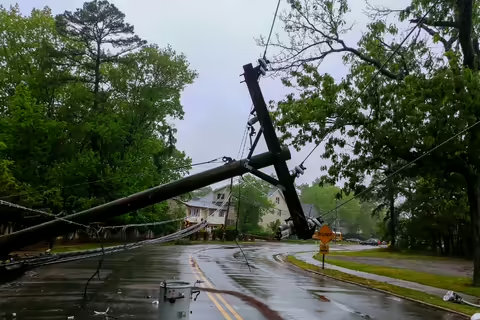SPRINGFIELD, Ill. – Summer storms may bring unexpected power outages during high temperatures. To get power restored as soon as possible, call your electric utility to report the outage.
“High winds and lightning that accompany severe storms can be the cause of many summer power outages,” said Erin Hollinshead, executive director of Safe Electricity. “Tree limbs or debris may have downed a power line and hide electrical hazards due to storm damage. It’s important to stay clear of downed power lines at all times, even when cleaning up after the storm.”
In the immediate aftermath of a storm, assume that any downed or hanging lines is energized, Hollinshead says. "If you are driving and come upon a downed power line, stay in your vehicle, warn others to stay away, and contact emergency personnel or electric utility."
Stop at all railroad crossings and treat road intersections with non-functioning traffic signals as a four-way stop before proceeding with caution.
University of Illinois Extension provides this list of important safety precautions if home power is out for several hours:
- Dress in loose, lightweight clothing and stay on the coolest, lowest level of your home.
- Use natural ventilation to cool homes and consider purchasing battery-powered fans.
- Drink plenty of water and avoid heavy meals and caffeinated or alcoholic drinks.
- Keep refrigerator or freezer doors closed. A freezer that is half full or full can keep foods frozen 24 to 48 hours. Foods should stay safe in an unopened refrigerator up to four hours. If an outage lasts longer than four hours, remove and pack meat, milk, and other dairy products in a cooler with ice.
- Use safe, alternative food preparation methods, such as an outdoor barbecue grill.
- Check on friends and relatives—especially children, seniors, and those with medical conditions or disabilities. These people may need to seek emergency cooling shelters.
- Make sure you know how to open your automatic garage door by hand.
- Close all drapes and blinds on the sunny side of your residence.
During an outage, Safe Electricity recommends turning off electrical appliances and unplugging major equipment, including air conditioning units, computers, and televisions. This will help protect equipment that could be damaged by electrical surges and prevent circuit overloads when power is restored. Leave one light on to indicate that power has been restored. Wait a few minutes then turn on other appliances and equipment one at a time, Hollinshead says.
If you use a standby generator, make sure a transfer safety switch is used, or connect the appliances directly to the generator output through an extension cord or isolated circuit before you operate it. This prevents electricity from traveling back through the power lines, known as “back feed.”
“Back feed creates danger for anyone near lines, particularly crews working to restore power,” said Hollinshead.
SOURCE: Erin Hollinshead, Executive Director, Safe Electricity
ABOUT EXTENSION: Illinois Extension leads public outreach for University of Illinois by translating research into action plans that allow Illinois families, businesses, and community leaders to solve problems, make informed decisions, and adapt to changes and opportunities.
ABOUT SAFE ELECTRICITY: Safe Electricity is the award-winning, public awareness program of the Energy Education Council, a 501(c) 3 (not-for-profit organization) established in 1952 on the campus of the University of Illinois at Urbana-Champaign. With offices located in Springfield, Ill., Safe Electricity operates under University of Illinois Extension and is led by the EEC Board of Directors. Since the Safe Electricity program was created in 2001, it has provided thousands safety-minded resources to its more than 500 utility members from across the country to help save lives and reduce injuries.
